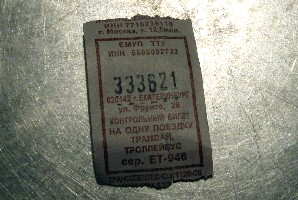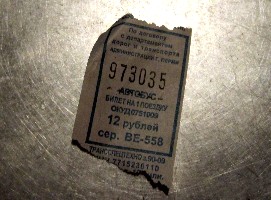Russian Realia: «Счастливый билет» [The ‘Lucky’ Ticket] Posted by josefina on Oct 27, 2009 in Culture, language
Since we recently had a post here on how to ride «общественный транспорт» [public transportation] in Russia – or perhaps it was really more about «виды общественного транспорта в Российской федерации» [types of public transportation in the Russian Federation] – let’s take a closer look at «проездной билет» [ticket (on buses, trams, trolleybuses, etc.)] in Russia today. Or more exactly: the interesting phenomena of the «счастливый билет» [the ‘lucky’ ticket] in Russia. Maybe not all of my dear readers know what it is that makes a Russian «проездной билет» [a ticket] «счастливый» [lucky]? I thought so! Aren’t you curious now? Well, let me explain.
In Russia there are two ways you can pay for public transportation. Either you can buy «проездной билет» [ticket] that entitles you to ride as much as you like on anything you want to – «на трамваях» [on trams], «на автобусах» [on buses], «на троллейбусах» [on trolleybuses] – for a specific amount of time. Usually the amount of time is a month (when you have to buy a new ticket depends on what Russian city you’re living in, sometimes in the middle of the month, sometimes closer at the end of it for the next month); one can buy a ticket for two weeks at a time also. When buying these kinds of tickets there are all sorts of «скидка» [discount, price reduction; rebate] one can receive if one belongs to a certain group in society. For example, there are «скидка для пенсионеров» [discount for pensioners], «скидка для школьников» [discount for school children], and – my personal favorite – «скидка для студентов» [discount for students]. This is of course the most «экономный способ» [economic; economical; thrifty way] of riding public transportation in Russia. But if you don’t use public transportation on a regular basis you might want to just buy a one-time «проездной билет» [ticket] already when you’re on the bus or the trolleybus. In Russia every bus, tram and trolleybus is still served by a person (usually a woman) selling these – «билеты на одну поездку» [tickets for one ride]. And that’s where the «счастливый билет» [the lucky ticket] enters into the picture.
On every ticket in Russia there are always six numbers. «Счастливый билет» [a lucky ticket] is a ticket where the total of the first three numbers equals the total of the last three numbers. If this is not clear enough, let’s take a look at a «наглядный пример» [demonstrative; illustrative; visual example]:
This is «несчастливый билет» [an unlucky, unfortunate; unhappy, sad ticket] from «Пермь» [Perm]. Why? Because 9 + 7 + 3 equals 19, while 0 + 3 + 5 equals 8. And 19 and 8 are not equal numbers, not even close!

This, however, is «счастливый билет» [a lucky ticket] from «Екатеринбург» [Yekaterinburg]. How come? Because 3 + 3 + 3 equals 9, and 6 + 2 + 1 also equals 9. Yay!
Russians always make sure to count and add up the numbers on their bus tickets, and if they receive a lucky one, then they’re always eager to inform you of this. One can actually call it a bit of a national game, if not even a kind of national sport! Don’t be surprised if you’re riding the bus with some Russian friends and they ask you: «У тебя билет счастливый?» [“Is your ticket lucky?”]. If you’re not sure how to add up your numbers I’m sure they’ll be more than happy to explain. I do it myself, too. And whenever I receive a ‘lucky’ one I feel like the day is going to be extra good, but when I don’t I just hardly pay any attention at all. Then it’s just a bus ticket and has no influence on my life at all… And I have a hunch that the way I look at this is also the way of most Russians!
Of course the adjective «счастливый» [glad, happy, pleased; fortunate; lucky] is made from the noun «счастье» [happiness, joy, gladness, cheerfulness; fortune, luck]. Other Russian nouns that would be more proper to use in the sense of ‘luck’ would be «удача» [luck; success; fortune; stroke of good luck, good innings] or «везение» [luck, good fortune]. But for some reason the adjective used together with bus ticket is not «удачный» [successful, fortunate, prosperous, lucky]. I guess that Russians like the concept of «счастье» more!
Have you ever received a lucky ticket in Russia? Where? If not, then I hope you’ll be sure to be on the look-out for one in the future!

Build vocabulary, practice pronunciation, and more with Transparent Language Online. Available anytime, anywhere, on any device.





Comments:
Simon:
If you receive a lucky ticket, are you not supposed to eat it?
Josefina:
Совершенно верно, Simon! The tradition (not among all Russians though, mainly this is practised by the younger generation) is to eat the lucky ticket afterwards. But not until you’re off the bus, of course, so you won’t have to pay a fine for not having a ticket!
Once I did eat my lucky ticket (in the spring of 2009) and I can say two things about this: a) I did not get sick; and b) I did not feel any luckier at all…
English-Scholar:
That is so different here, where i live we usually just use busses but a ticket is only for 1 good use, you can buy a pass which is good for month. I guess a small ticket like that would be easier to lose so you have to by another one.
I guess thats a little difference between our cultures, check out http://skype-englishschool.com/ for a free trail english lesson, Or check out their youtube page http://www.youtube.com/user/skypeenglishschool
Leo:
Я всегда смотрю – счастливый билет или нет)) Правда, никогда не ем…
80% – сбывается!
Eugene Azarenko:
So deep penetration in Russian urban culture! You are right: most of the Russians try to check whether their ticket is lucky or not. And if it’s lucky, they sometimes eat it (not very often actually).
Ray Blakney:
I actually lived in Russia for a while as an English teacher, and I remember this tradition. My first few weeks I stayed with a host family in which the mother would make all the kids save their stubs and go through them every weekend. It took me a while to figure out why they were doing that.